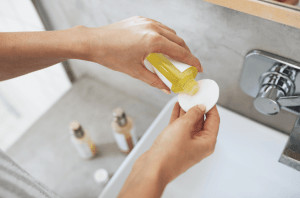The Truth About Sunflower Oil: Is Sunflower Oil Healthy?

When I was growing up, we had the prettiest sunflowers growing in our backyard. They were really healthy and grew way taller than me. I had never seen anything like it before. It felt like they were at one with the sun! The sunflowers brought me such joy, until one summer a thunderstorm had them crashing to the ground. I was pretty devastated, and that’s really the last time I thought about sunflowers. This was until I recently discovered sunflower oil and wanted to know more about my beloved childhood flower.
With the rising awareness of the multitude of uses of natural oils beyond cooking, I was intrigued as to how sunflower oil played its part in the natural oil battle. Natural oils such as olive oil, jojoba oil, and avocado oil are gaining popularity in the beauty and skincare industry – and for good reason! Although sunflower oil is in no way a ‘new oil’, it’s debut in the beauty industry is somewhat recent (let’s blame coconut oil for taking all the spotlight, right?). Sunflower oil is rich in numerous beneficial compounds for your health, but how does it compare to other nourishing oils?
Sunflower Oil Vs Olive Oil

Olives hanging on an olive tree.
On one side of the ring we have sunflower oil, and on the other, we have olive oil. Who is going to win this fight? Well, let’s take a look at the properties of each oil to determine which one is the champ.
When it comes to fat content, both olive and sunflower oil put up a good fight. Sunflower oil contains 65% linoleic acid in comparison to olive oils meager 10%. That being said, olive oil is rich in oleic acid which contains cancer-fighting properties. When it comes to your skin and hair, this is something that cannot be easily overlooked! What’s more is that both of these oils have a high omega-3 and 6 fatty acid content which help to not only nourish your body from the inside out, but also your skin and hair.
Moving onto vitamin E content and it looks like once again, it’s a tight draw. Vitamin E is a potent antioxidant that helps to reduce the damage of free radicals. This gives both oils potent anti-aging properties that help you to maintain a youthful complexion. When you combine this with the fatty acids found in both oils, you’ve got yourself a couple of oils that really pack a punch in terms of nourished skin.
That being said, the oils don’t work the same on all skin types. For some, sunflower oil is hydrating, for others irritating. For some, olive oil is a potent anti-inflammatory, and for others it causes redness. When it comes to these deeply replenishing and hydrating oils, it may just be a case of trying out which one works best for you! Let’s move on to the ultimate sunflower question: is it good for you?
Is Sunflower Oil Good For You?

Girl holding sunflower.
Okay, so the flower is undeniably aesthetic, but is the oil good for you? The main component of sunflower oil, linoleic acid, is an essential fat. This means that your body needs it but can’t create it on its own. With this in mind, sunflower oil provides you with nourishment that you literally need! That has to be good for you. Additionally, linoleic acid is an important nutrient for the formation of cell membranes, particularly in your skin, which means that sunflower oil can be extremely beneficial for your complexion.
When you combine this with the fact that the compounds found in sunflower oil also work to alleviate inflammation, you might have just found your new favorite natural skincare ingredient. Inflammation, both internal and external, is not usually a good thing. The anti-inflammatory properties found in sunflower oil can leave your skin healthy and glowing.
What’s more, is that sunflower oil is a powerful oil beyond its skin benefits. The rich fatty acid content and anti-inflammatory properties also have the potential to have a positive effect on your cardiovascular health. Heart health is not something to take lightly. The good news is (for those of us who use natural ingredients at least) is that what you put onto your skin is absorbed into your bloodstream, at least to some degree. This means that using sunflower externally, can also benefit you internally – however small this impact is, it’s a positive one. Now that you know why this oil is a must-have, you might be wondering how to make your own!
How To Make Sunflower Oil

DIY Sunflower oil.
Before we get started on how to make sunflower oil, it’s important to understand the sunflower plant. Specifically, there are two types of sunflower seeds. The first is small and is used as an oilseed. It has a thin shell and the seed contains up to 50% oil. The other seed is larger and is mostly used for consumption. It contains around 30% oil. So clearly, the first type of seed is the preferred option for making sunflower oil.
Now, you’ll need a lot of seeds to make your own sunflower oil. In order to make 3 gallons of oil, you will need 35 pounds of oil seeds. If you’re using your own sunflowers to get the seeds, you will need around 140 plants for the job. Aside from the seeds, you’ll also need a roasting pan, a strainer, and a container which is heat-resistant.
Start by putting the oilseeds in a blender and grinding them until they reach a fine consistency. Transfer them to the roasting pan and place them in the oven at 300°F. Leave them in for 20 minutes, mixing them every 5 minutes or so. Take the pan out to cool for a minute, and then pour the contents through a strainer and into the container.
You can store the oil that results from this process in containers in your fridge. Since it contains no preservatives, you should make sure to use the oil within a month of producing it. You can freeze the leftover mashed seeds in order to reheat them later to get more oil from them. Alternatively, you can use the leftovers for bird food.
Get your own Pure Sunflower Oil today here at Maple Holistics!
Conclusion
After falling in love with sunflowers as a child, I’m now starting to love sunflower oil as an adult. Sure, there are a bunch of other oils with plenty of health benefits to choose from. Olive oil, for instance, is a worthy opponent. But I’m personally a fan of sunflower oil’s Vitamin E, omega-3 and omega-6 fatty acids, and heart-healthy attitude. It’s also a non-comedogenic oil which means that you can use it on your skin without clogging your pores!
There are many ways to use this floral oil beyond your kitchen, but if you’re not sure where to start, let me give you a few ideas. You can use it as a stand-alone moisturizer by simply massaging gently into clean skin until fully absorbed. Alternatively, you can add a few drops of pure sunflower oil into your favorite skincare products to give them a moisturizing, anti-aging boost. Finally, you can use sunflower oil as carrier oil alongside a range of beauty DIY’s. Whenever you read “mix these essential oils with an appropriate carrier oil”, just replace “appropriate” with “sunflower oil” and your skin will thank you for it! Whatever way you decide to bring sunflower oil into your life, you probably won’t regret it. That’s just how it is with natural oils.


